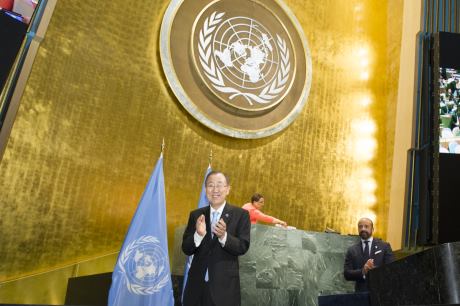The Paris Climate Change Agreement crossed the first of two thresholds required for it to enter into force after 31 governments yesterday formally submitted their instruments of ratification, acceptance, approval or accession.
 |
| Ban Ki-moon, pictured in the UN General Assembly Hall during the High-level Event on the Paris Agreement (Image: UN/Rick Bajornas) |
It is expected to cross the second threshold - ratification by countries representing a total of 55% of global emissions - later this year.
Sixty countries representing 47.5% of global greenhouse gas emissions have now joined the agreement after Albania, Antigua and Barbuda, Argentina, Bangladesh, Belarus, Brazil, Brunei Darussalam, Dominica, Ghana, Guinea, Honduras, Iceland, Kiribati, Madagascar, Mexico, Mongolia, Morocco, Namibia, Niger, Panama, Papua New Guinea, Senegal, Singapore, Solomon Islands, Sri Lanka, Swaziland, Thailand, Tonga, Uganda, United Arab Emirates, and Vanuatu deposited the required documents at a special event hosted by United Nations Secretary General Ban Ki-moon.
A further 14 countries, representing 12.58% of emissions, have committed to joining the agreement in 2016, "virtually assuring" that it will enter into force this year, the UN said yesterday.
The agreement was adopted by parties to the UN Framework Convention on Climate Change (UNFCCC) last December in Paris and signed by many parties early this year. Its main aim is to keep global temperature increases this century well below 2 degrees Celsius, and drive efforts to limit temperature increases to below 1.5 degrees Celsius, which UNFCCC says is a "significantly safer" defence against the worst impacts of climate change. It will enter into force 30 days after its 55 countries, representing 55% of global emissions, deposit their instruments of ratification, acceptance or accession with the UN Secretary-General.
"This momentum is remarkable," Ban said. "It can sometimes take years or even decades for a treaty to enter into force. It is just nine months since the Paris climate conference. This is testament to the urgency of the crisis we all face." He called on world leaders to step up their domestic efforts to join the agreement this year. "What once seemed impossible is now inevitable," he said.
Patricia Espinosa, executive secretary of the UNFCCC, said the "extraordinary momentum" was a "clear signal" of determination to implement the agreement. "Today we can say with ever more confidence that this historic moment is likely to come very soon, perhaps even by the time governments meet for the next round of climate negotiations in Marrakech, Morocco in November," she said.
China and the USA, two of the world's largest carbon emitters, joined the agreement in September, which the UN said provided "considerable impetus" for other countries to complete their domestic ratification or approvals process. Austria, Australia, Bulgaria, Cambodia, Canada, Costa Rica, Cote d’Ivoire, the European Union, France, Germany, Hungary, Kazakhstan, New Zealand, Poland, and the Republic of Korea have all announced their commitment to join the agreement before the end of the year. UK Prime Minister Theresa May confirmed to the UN General Council this week that the country will start the procedure to enable ratification of the agreement.
Entry into force will transform the climate action plans, or Intended Nationally Determined Contributions (INDCs), submitted by nations in the run up to the Paris conference into Nationally Determined Contributions (NDCs). Governments will also be obligated to take action to achieve the two temperature limits enshrined in the agreement.
Nuclear power will play a part in many countries' decarbonisation plans. World Nuclear Association director general Agneta Rising said last week the nuclear industry can achieve the momentum required to create an additional 1000 GWe of new capacity by 2050 needed to meet increasing global energy demand whilst ensuring climate goals can also be achieved.
Researched and written
by World Nuclear News







_94566.jpeg)






